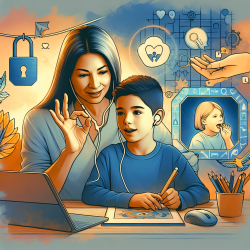Introduction
In today's fast-paced world, telehealth has emerged as a revolutionary tool in healthcare, offering accessibility and convenience like never before. A recent study titled Postpartum Women’s Perspectives of Engaging with a Dietitian and Exercise Physiologist via Video Consultations for Weight Management: A Qualitative Evaluation sheds light on the potential of video consultations in delivering effective healthcare services. Although the study focused on postpartum women, its findings have significant implications for speech-language pathologists (SLPs) and other practitioners providing online therapy services, such as those offered by TinyEYE.
Key Findings and Their Implications
The study explored postpartum women's experiences with video consultations for nutrition and exercise guidance. Participants reported that video consultations were convenient, did not differ significantly from in-person sessions, and were highly acceptable. These findings underscore the potential of video consultations in overcoming traditional barriers to accessing healthcare, such as time constraints and the need for childcare.
Enhancing Therapy Outcomes with Video Consultations
For practitioners in the field of speech-language pathology, particularly those involved with online therapy services like TinyEYE, these insights can be transformative. Here are some ways to leverage video consultations for improved therapy outcomes:
- Convenience and Accessibility: Video consultations allow clients to receive therapy from the comfort of their homes, reducing travel time and associated stress. This is particularly beneficial for children and families with busy schedules.
- Personalized Care: Just as the study participants valued tailored advice, SLPs can customize therapy plans to meet the unique needs of each child, enhancing engagement and effectiveness.
- Increased Engagement: The flexibility of scheduling and the ability to conduct sessions in a familiar environment can lead to higher engagement levels, crucial for achieving therapy goals.
- Overcoming Barriers: Video consultations can help overcome barriers such as geographical distance, making it easier to reach underserved populations and ensure continuity of care.
Encouraging Further Research
While the study provides valuable insights, further research is needed to explore the full potential of video consultations in various therapeutic contexts. Practitioners are encouraged to contribute to this growing body of knowledge by documenting their experiences and outcomes with telehealth interventions.
Conclusion
The integration of video consultations into therapy services offers a promising avenue for improving access to care and enhancing therapy outcomes. By embracing this technology, practitioners can deliver more flexible, personalized, and effective therapy, ultimately leading to better outcomes for children.
To read the original research paper, please follow this link: Postpartum Women’s Perspectives of Engaging with a Dietitian and Exercise Physiologist via Video Consultations for Weight Management: A Qualitative Evaluation.










